#claus clausen
Explore tagged Tumblr posts
Text

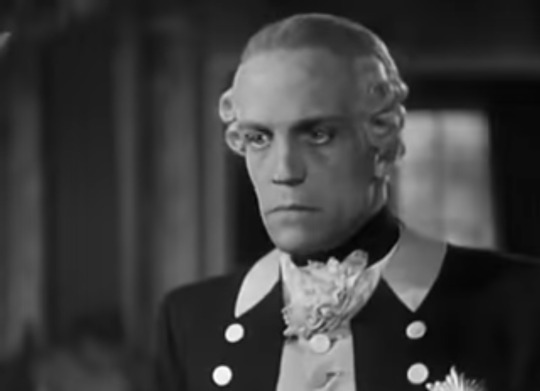
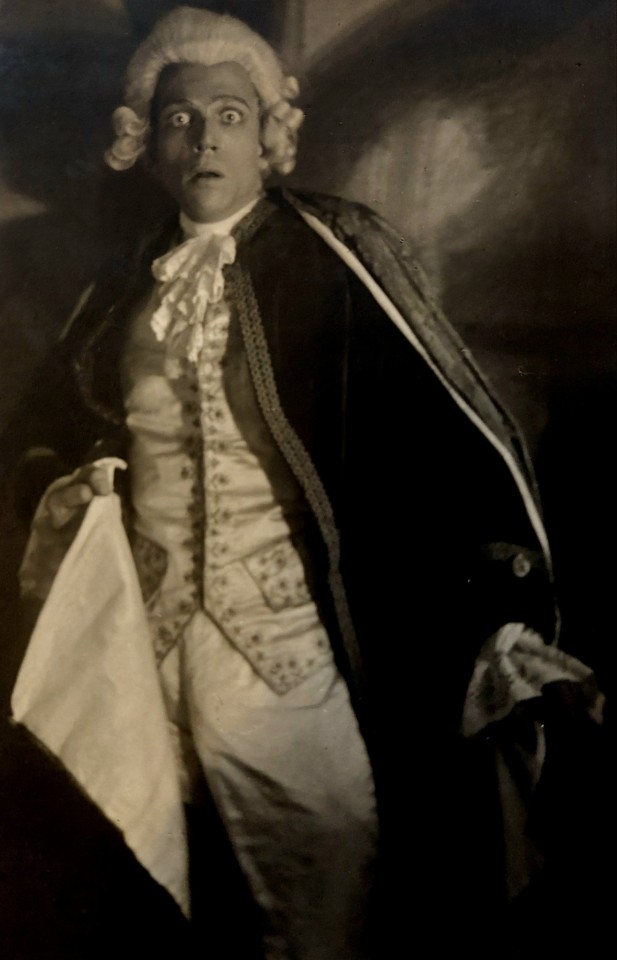
So you know that Claus Clausen played Hans Hermann von Katte in "Der alte und der junge König" (1935). You may also know that he played Prince Heinrich in "Der große König" (1942) but now I found this: him as young Friedrich 1930 in Königsberg on stage.
He played them all.
#hans hermann von katte#von katte#katte#prince heinrich#heinrich von Preußen#prussia#henry of prussia#frederick the great#fritz#old fritz#friedrich der grosse#i normally dont post about that but look at him!!#we stan#der alte und der junge König#fratte#claus clausen
20 notes
·
View notes
Text
WESTFRONT 1918:
Four German soldiers
No comfort returning home
Driven mad by war
youtube
#WESTFRONT 1918#random richards#poem#haiku#poetry#haiku poem#poets on tumblr#haiku poetry#haiku form#poetic#criterion collection#criterion channel#Vier von der infanterie#Fritz Kampers#Gustav Diessl#Hans-Joachim Mobis#Claus Clausen#Jackie Monnier#Hanna Hoessrich#Else Heller#g.w. pabst#GW Pabst#georg wilhelm pabst#Ernst Johannsen#Ladislaus Vajda#Peter Martin Lampel#war movie#Youtube
0 notes
Photo
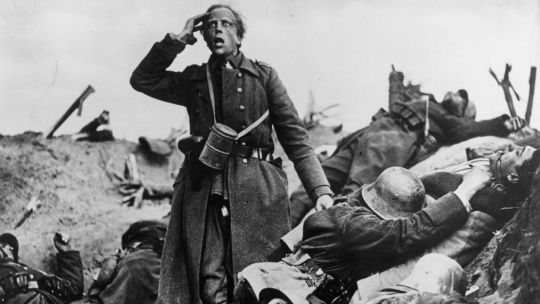
Westfront 1918 (G.W. Pabst, 1930)
Cast: Fritz Kampers, Gustav Diessl, Hans-Joachim Möbis, Claus Clausen, Jackie Monnier, Hanna Hoessrich, Ersa Heller. Screenplay: Ladislaus Vajda, Peter Martin Lampel, based on a novel by Ernst Johannsen. Cinematography: Charles Métain, Fritz Arno Wagner. Art direction: Ernö Metzner. Film editing: W.L. Bagier, Jean Oser, Marc Sorkin. Music: Alexander Laszlo. Authenticity is a problematic criterion to apply to any work of art, but especially a motion picture, considering that fakery is a given at almost every level of its creation. Even a documentary is subject to editing, narration, and various manipulations of point of view. We usually critique a film's authenticity only when it serves our own agendas, or when it is so manifestly lacking that it stretches credibility. Pabst's Westfront 1918, an exceptionally effective movie about German soldiers in the last days of World War I, just happened to be released in the same year as All Quiet on the Western Front (Lewis Milestone, 1930), which won the best picture Oscar. The German soldiers in All Quiet are Americans like Louis Wolheim (born in New York), Lew Ayres (from Minneapolis), and Ben Alexander (from Nevada). Pabst's film features German and Austrian actors, one of whom, Gustav Diessl, had actually been a prisoner of war during World War I. So Westfront 1918 would seem to have the authenticity criterion sewn up. Does this necessarily make it a better film than All Quiet? The truth is, I would have to rate it a draw: What Milestone's film lacks in authenticity it makes up for with Hollywood finesse, an efficiency in storytelling and the polish brought by technical expertise. There are parts of Pabst's film that seem extraneous, such as the section in which the troops enjoy some rather corny vaudeville routines. But the movie also has an abundance of extremely well-staged combat scenes that demonstrate the confusion and terror, the "fog of war." And it has a core of fine performers -- especially Diessl as Karl, who goes home on leave to find his wife in bed with the butcher who has been supplying her with food in exchange for sex, but also Hans-Joachim Möbis as the naïve student who falls in love with a French girl, and Claus Clausen as the lieutenant who has a mental breakdown under the strain of combat. With its home front scenes, Pabst's has that undeniable depth of feeling that can only come from an awareness of what that disastrous war did to the country in which the actors and filmmakers lived. Three years after Westfront 1918 was released, to a good deal of controversy about its treatment of the war as folly, it was suppressed by the newly emergent National Socialist regime as deleterious to morale. Pabst's film concluded with the word "Ende?!" which in itself qualifies as prophetic.
7 notes
·
View notes
Text
Choose your favorite lieutenant:
Friedrich Wilhelm Kaiser (Fridericus Rex)[1921-1923]

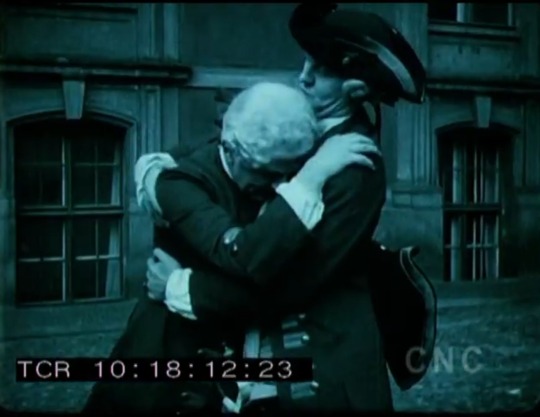
Claus Clausen (Der junge und der alte König)[1935]

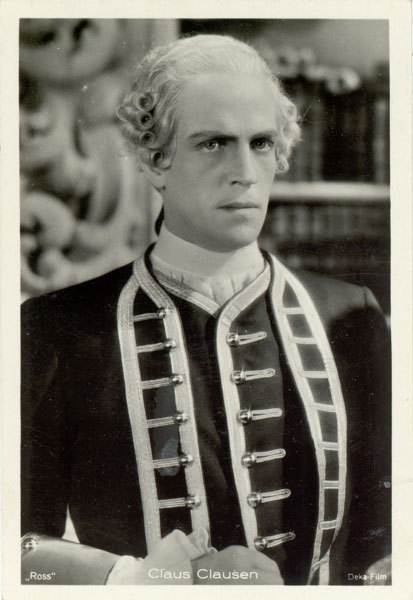
Jan Niklas (Der Thronfolger - Die harten Jugendjahre von Friedrich dem Großen von Preußen) [1980! I wrote in the other post 2010. I am sorry]

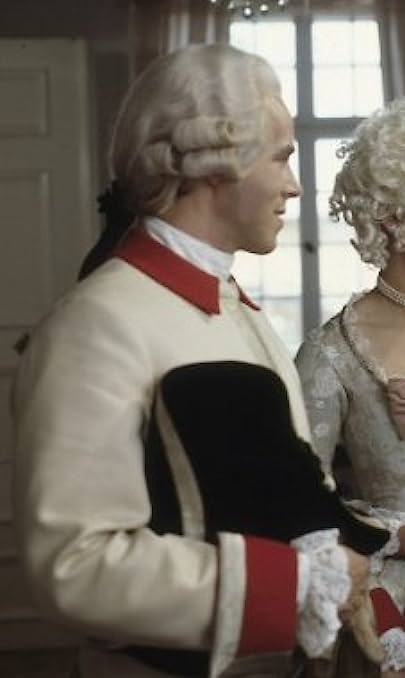
Michel Diercks (Friedrich der Große - Alles oder nichts) [2011]
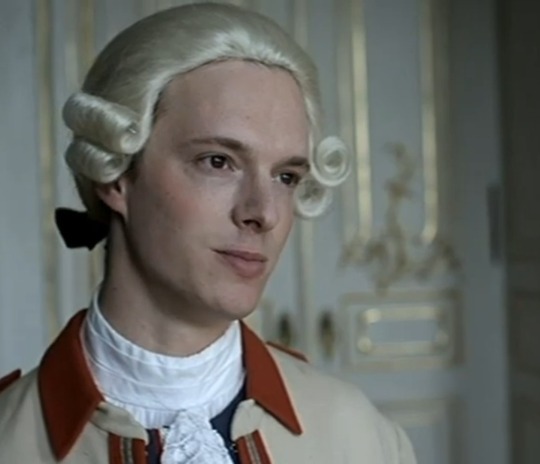
Kai Michael Müller (Friedrich - Ein deutscher König) [2011/2012]
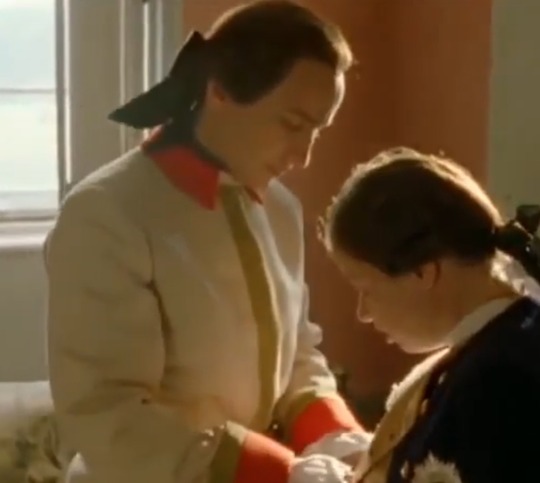
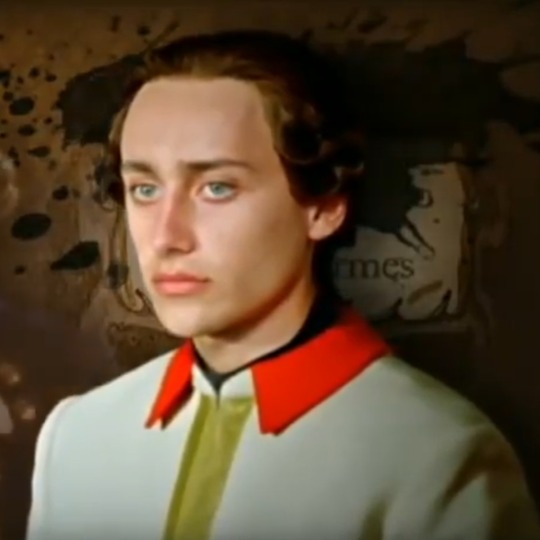
Maximilian Mann (Friedrich - Mythos und Tragödie) [2012]

5 notes
·
View notes
Text
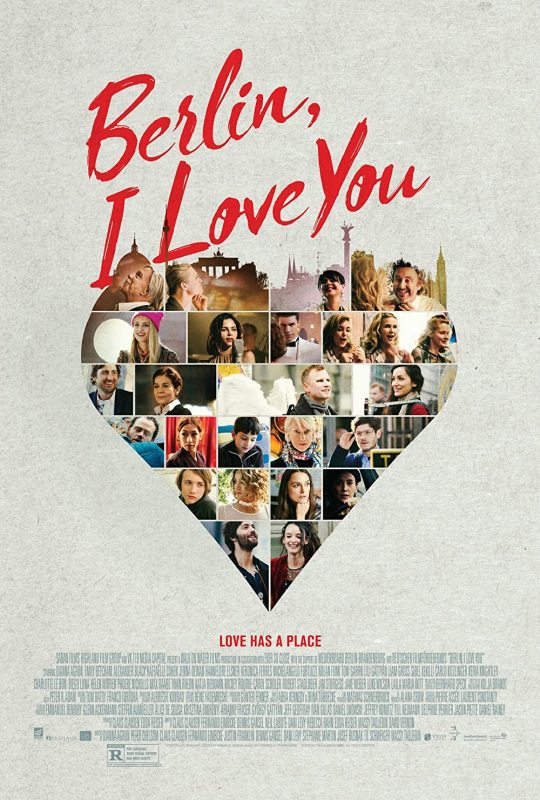
Berlin, I Love You | Berlim, Eu Te Amo
2019
Dianna Agron, Peter Chelsom, Claus Clausen, Fernando Eimbcke, Justin Franklin, Dennis Gansel, Dani Levy, Daniel Lwowski, Stephanie Martin, Josef Rusnak, Til Schweiger, Massy Tadjedin and Gabriela Tscherniak
#Berlin I Love You#Berlim Eu Te Amo#2019#Dianna Agron#Peter Chelsom#Claus Clausen#Fernando Eimbcke#Justin Franklin#Dennis Gansel#Dani Levy#Daniel Lwowsk#Stephanie Martin#Josef Rusnak#Til Schweiger#Massy Tadjedin#Gabriela Tscherniak
1 note
·
View note
Photo
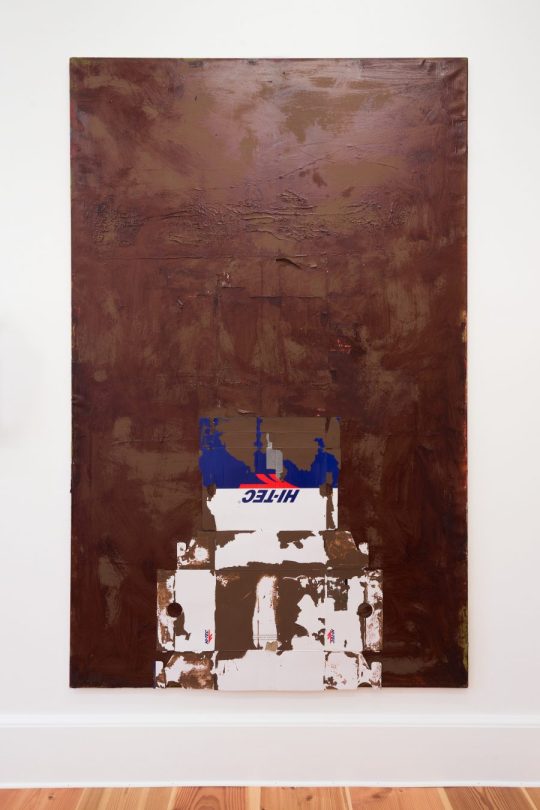
Nina Manobra at Jir Sandel
36 notes
·
View notes
Text
Fredericia mødte toppen i 3-bande carambole
Fredericia mødte toppen i 3-bande carambole
Fredericia Billard Klub var i weekenden i action imod Varde BK. Varde Billard Klub vandt i 2021 slutspillet i Elitedivisionen og blev danske mestre for hold. Så de Fredericianske drenge var oppe imod toppen af Eliten. Trods en god indsats blev resultatet ikke storslået for Fredericia, der måtte rejse hjem med et nederlag i kufferten. Lørdag den 26. – Varde BK – Fredericia 6-2,…
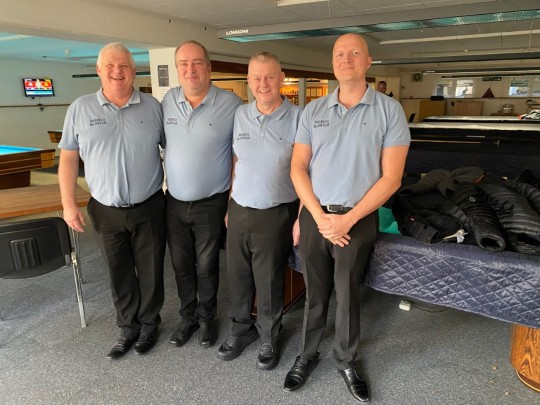
View On WordPress
0 notes
Text
Pop Culture Kattes Part 2 - A Collection of filmed Kattes
What did the invention of Film lead to if not an abundance of new Kattes for me to rate. As usual, the rating system is made up and the points don't mean a thing.
PART I
Cserépy-Film Co. GmbH - Fridericus Rex. Teil 1: Sturm und Drang (1921)
The first of many Fridericus Rex movies! Sadly I can't get ahold of a copy of this movie (there appears to be one in the Archives françaises du film...) and the reviews focus mostly on Otto Gebühr as Fritz. However, we do have two images of Friedrich Wilhelm Kaiser as everyone's favourite traitor:
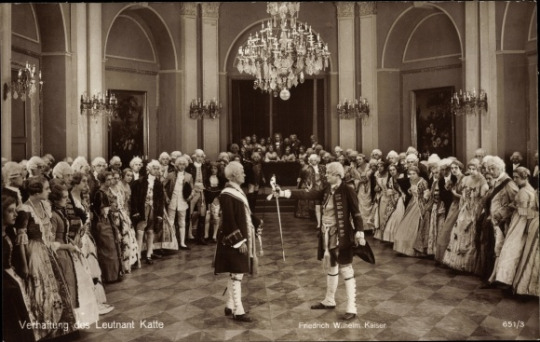
Yes, okay, the honorable Lieutenant getting arrested at the ball, very nice. Ugly wig, but what else is new. Pretty standard Katte, as it seems. Now, what is the second pictu-
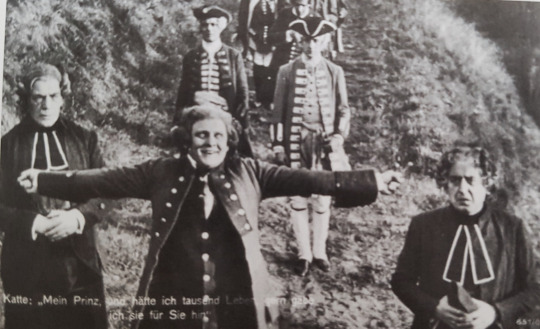
... Sheesh, that's terrifying. VERY happy to die for a Prince that he loves, that one. Also where are they? Definitely not Küstrin, by the looks of it. And why does the priest on the left look like Ian McKellen's grandpa in a Princess Leia wig?? So many questions that will never be answered.
Overall rating: ???
Deka-Film GmbH - Der alte und der junge König (1935)
We're moving on to the Nazi-Propaganda-stage of the Fridericus movies. But we're not here for an in-depth analysis (which would be warranted...), we're here for Katte! Portrayed by Claus Clausen, who would move on to play Prince Henry in another Fridericus movie seven years later and definitely looks more like Henry than Katte imo. He's all angles and cheekbones and light eyebrows and is ten years too old for Katte (and way too tall for either of them). The acting is... intense. There's no better word for it, every move he makes is intense.
Character wise, uh... he's a tough one, but he softens over the course of the movie. In his first appearance he shows up out of the blue in a pose that screams "ready to fight", in his second scene he tells Fritz that he's ashamed of him. Actual dialogue: "Are you Katte or are you the King?" "I am Katte. 😡😡 Your friend. 😡😡" He's SUPER passionate about being a soldier ("You pull me into this, ME, the SOLDIER Katte!!" who almost didn't return from England just a year prior, but ANYWAY). We get a scene with Wilhelmine discussing the miniature portrait he refused to return; as per usual it is conveniently forgotten that Fritz was also in this miniature portrait in favour of some romantic subtext. Katte gets all shy around her, which is surprising because in his scenes before that all he did was yell. I'd probably find it somewhat endearing, if they weren't Katte and Wilhelmine. We later see him in jail, gazing fondly at the miniature of JUST Wilhelmine before telling Müller to hand it to Fritz together with his last letter.
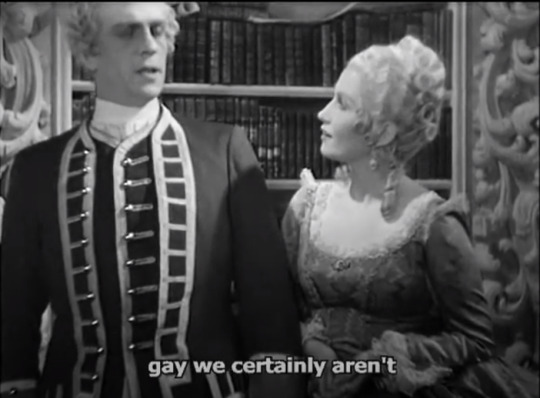
Indeed, Katte, indeed. Speaking of the portrait: We aren't told that he painted it himself. He just... has it. For reasons. We aren't told about his musical talents either; all we know about him is that he's a man of honour and a soldier in an unspecified regiment in Potsdam. He does have his moments, his dynamic with Fritz improves drastically after the first two scenes and he does seem like he cares, especially after witnessing one of FW's freakouts while hiding in the closet (lol). And he gets to comfort Fritz a little bit after that. After doing a complete 180° considering his views on desertion, he dies for a master he loves and would sacrifice 1000 lives for him. Could have used some more friendly scenes with Fritz or any scenes of what Katte did between agreeing to desert and dying, but the main character of this movie is FW, so we can't afford that. Despite some early difficulties I'd say he's a pretty solid Katte. I like a few scenes. Nothing special, but nothing egregiously bad either.
Overall rating: 5/10 intense stares, watchable mainly for comedic FW scenes
ZDF (Zweites Deutsches Fernsehen) - Der Thronfolger (1980)
Finally, a Katte with proper eyebrows!! Other than that, his biggest contribution is to help hide the affairs of the straightest and horniest Crown Prince known to film from a far too chill FW. How does he do that? Who knows. Once again we are treated to very few scenes of him and Fritz spending time together and actually being friends. We get about one and a half. Blergh. Character wise, he's... eh. Doesn't do much. Smiles more than other Kattes. Says that he adores Fritz and reads Voltaire with him, so at least we get a hint at his intellectual pursuits; no other hints at what he does apart from his job as Some Guy Who Follows FW Around. Has the audacity to grab Mine's arm and pull her back into her seat. We do get an interrogation scene where he claims to have done his best to thwart Fritz's plans at all times (none of which was shown to us) and before the execution he talks about how he pretended to be an atheist for clout for a while (which was also not shown to us). Other than that, we barely get to know Katte despite him meeting Fritz almost two years too soon. And his last words to Fritz are "Nothing of forgiveness. My death is an act of divine justice" which... is better than "Long live the King", I guess...? Eeeeh, didn't like it...
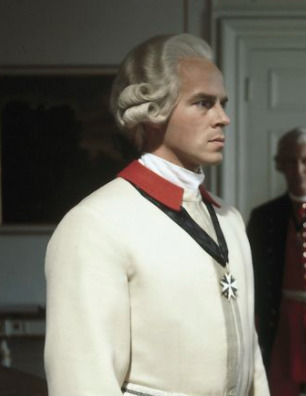
However: Aesthetically speaking, I'd say he's probably the best on this list. At 33 Jan Niklas is a little old (especially when he moves his face and looks 40 next to Fritz who is 20 and looks 12) and a wig that high with a forehead that high was... a choice (we're not quite entering Henry territory yet...), but look-wise he's pretty solid overall. I'll admit it, I'm just really happy about the eyebrows. Dark eyes, dark eyebrows, at least somewhat tan complexion - nice.
Overall rating: 3/10 splendid eyebrows, wouldn't recommend this movie overall, mainly because Fritz is kind of terrible imo
ARTE - Friedrich. Ein deutscher König (2011)
The One With The Women As Fritz and one Kai Michael Müller as Katte. He recently played a corpse in a Tatort that I saw, that was interesting. Anyway. The movie is a 90 minute documentary about Fritz's entire life, so he's only in it for a few minutes. Not much of a character to judge, but at least he's not in love with Wilhelmine in this one. He does get that scene where he buttons Fritz's uniform and comments on how good he looks in it... And the narration tells us about his musical interests, his military career, and how close he was to Fritz. So we've got the basics down.
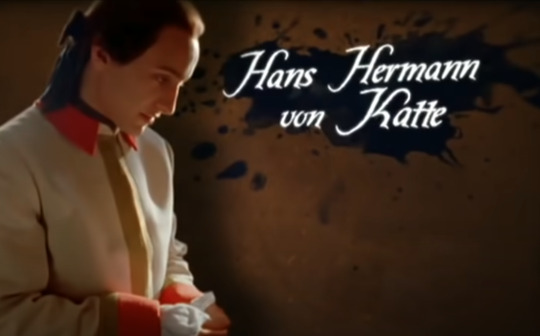
Aesthetically speaking, Kai Michael Müller is, once again, no Katte. Interestingly, instead of being too old like everyone else, he is actually too young - He's 30 now, and the movie is ten years old! Dang. Acting wise, it's... It's a documentary, I've seen worse. Some varying intonation would be nice though, maybe some emotion behind his lines... He talks like a soccer player in a post-game interview. I personally love how they do the keyhole-zoom-out thing over Fritz and Katte's faces and then cut to Dorgerloh saying "Well, we don't KNOW what they did and I don't want to speculate" - You may not, but Arte sure does.
Overall rating: 4/10 homoerotic things behind closed doors, watchable for a documentary
Spotlight Musicals - Friedrich. Mythos und Tragödie (2012)
Oh, FMuT, the things we could have had... I have feelings about this thing, considering I've spent hours of my life subbing it. This Katte is so straight, he's barely even friends with Fritz. Which is pretty much the worst you can do. I don't even expect people to make their relationship romantic, I'd just like them to portray a good friendship for once... Whenever they're on stage together during his lifetime, Katte is usually preoccupied with Wilhelmine and doesn't spare Fritz a second glance. Which is even weirder when you consider that the very same Fritz apparently felt so strongly about him that he hallucinated his ghost before he died (The whole thing reads as "Fritz is in love with him and Katte is too dumb and Wilhelmine-focused to notice, but also we didn't want to lose our conservative audience by making Fritz anything but straight, so we gave Countess Orzelska a sexy solo to cement his heterosexuality").
They don't even have a duet. Katte has major singing parts in his duet with Wilhelmine (which I skip every time) and a song with Mine and Fritz, is in the ensemble for maybe two more songs and gets two lines in the finale; LET HIM SING, GOD DAMNIT, HE'S ON STAGE 90% OF THE TIME! The very cool concept of Ghost Katte showing Fritz how much he's changed over the years was truly wasted on this show - as was Bienvenue in Sanssouci, because that song is a banger. But hey, at least they hug twice and we get that kiss we didn't get in Zeithain...? Even if it's played for a laugh...? Yay...? His personality is alright, I guess. He hides Fritz's flute, protects him from FW once and dreams of a more cultured future while still being very much a military man (in the infantry, for staging reasons...) and ghost-Katte is not afraid to tell Fritz that he thinks he sucks. We just don't really get why he even cares about Fritz in the first place or why Fritz cares about him. Oh, and he doesn't get ANY last words. What the fuck.
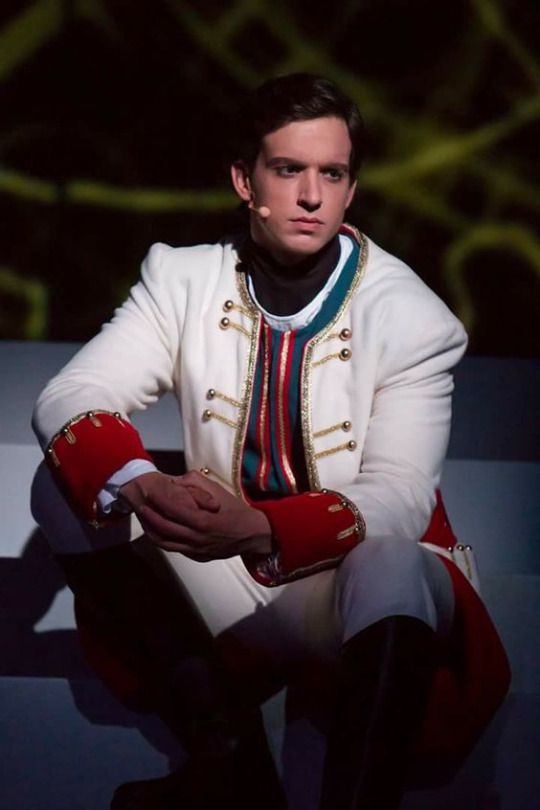
As for his looks: Maximilian Mann doesn't necessarily look like Katte, but it's better than others and at least he was about the right age (24 in the 2012 run, 26/27 when it came to Fulda two years later). In this specific picture, he even has acceptable eyebrows and the gloomy look that Wilhelmine mentions! A wig could have been nice (apparently they used one for another actor...?), but considering the wig quality we see on other people on stage, maybe it's good they went with his natural hair. I feel like I'm being a little hard on this one, but I love musicals and thus I'm very mad about the wasted potential. Also the man can sing, I've seen him live, give him a solo.
Overall rating: 4/10 Nonexistant duets, fun if you skip the right songs
And that's all for today, folks! One kissing gif for the road:
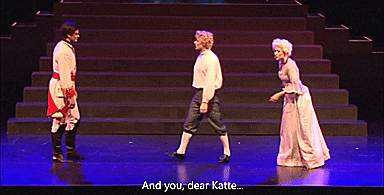
PART III
43 notes
·
View notes
Text
It was the week before Christmas, and all through the town, the excitement was palpable. Lights twinkled on every street corner, wreaths adorned the doors of every house, and holiday music filled the air.
At the heart of the town was a cozy little bookstore, nestled among the bustling shops and restaurants. Inside, the proprietor, Mrs. Clausen, was busy wrapping gifts and preparing for the holiday rush.
As she worked, she hummed to herself, lost in thought. She had always loved Christmas, with its warmth and joy and magic. It was her favorite time of year, and she was determined to make it special for everyone in the town.
As the days passed, the town grew more and more festive. Children hung up their stockings and wrote letters to Santa, while adults bustled about buying gifts and decorations. The town square was transformed into a winter wonderland, with a towering Christmas tree and a giant menorah.
On Christmas Eve, Mrs. Clausen closed up the bookstore early and made her way home. As she walked, she marveled at the beauty of the town, with its sparkling lights and happy faces. She couldn't wait for Christmas morning, when she would wake up to the sound of carolers and the sight of her tree, covered in presents.
As she approached her house, she was startled by a faint jingling sound. She turned to see a sleigh being pulled by eight tiny reindeer, hovering just above the ground. And at the reins was none other than Santa Claus himself, smiling and waving at her.
"Merry Christmas, Mrs. Clausen!" he called out. "I hope you have a wonderful holiday!"
Mrs. Clausen was stunned, but she managed to stammer out a thank you as Santa and his reindeer flew off into the night. She stood there for a moment, dazed and delighted, before shaking her head and heading inside.
As she settled into bed, she couldn't stop thinking about her encounter with Santa. It had been a magical moment, one that she would always remember. And as she drifted off to sleep, she knew that this would be the best Christmas ever.
MERRY CHRISTMAS ☃️
5 notes
·
View notes
Text
It's even better: MARek TAnnhaus -> MARTA
i was just reading in the tags that it doesn’t make much sense as to why tannhaus would be the origin, but i think it kinda does? tannhaus was always the only piece in the story that didn’t really “fit”. even aleksander did kind of fit….because his crime led the inspector into town, and clausen triggered the apocalypse. but tannhaus only ever existed to either be charlotte’s granddad or to make the time machine, but both of these things are paradoxes! neither of them should exist! but while charlotte’s existence IS explainable (there is the factor of noah existing as an outside influence), tannhaus’ book, which is essentially how time travel is invented AND the base of the entire series, is never explained…..because it is something that comes from neither world. it was created in the third world. it’s the origin point.
and why it affected martha and jonas specifically…i read a theory on reddit that martha and jonas are a fold to tannhaus’ son and his wife. tannhaus’ son is MARek, the male version of MARtha, and marek’s wife is SONJA, which is literally an anagram for…………….jonas. and while jonas and martha’s offspring is a boy, marek and sonja’s is a girl, because in the same way everything in world 2 is a mirror of world 1, everything in the origin is the opposite of the original. so when tannhaus tried to go to a world where his family was still alive, he inadvertently created versions of it where they did, in different forms
#the only thing that still irks me is the question why aleksanders real name is niewald. i guess it was meant as a red herring but still#i also thought the last name clausen had a meaning since he said he took it from his mother and clau- sen could mean son of claudia
711 notes
·
View notes
Text
Johan Christian Clausen Dahl
Johan Christian Clausen Dahl (* 24. Februar 1788 in Bergen; † 14. Oktober 1857 in Dresden; oft I. C. Dahl oder J. C. Dahl genannt) war ein norwegischer Landschaftsmaler der Romantik und enger Freund von Caspar David Friedrich. Von 1818 bis 1857 lebte und wirkte er in Dresden. Dahl war Mitglied der Kunstakademien in Kopenhagen (seit 1827), Stockholm (seit 1832) und Berlin (seit 1834).
Dahls Vater Claus Dahl (1750–1823) war Fischer und Fährmann, seine Mutter Elsa Birgitte Johnsdatter starb 1828. Von 1803 bis 1809 absolvierte er eine Dekorationslehre in Bergen/Norwegen. Im Jahr 1811 bezog er die Kunstakademie Kopenhagen, wo er bei Christian August Lorentzen studierte, und zog 1818 nach Dresden. Im Juni 1820 heiratete er Emilie von Block (Tochter des Konservators Heinrich von Block und Caroline von Bege). Emilie von Block starb 1827 im Kindbett. Im Januar 1830 heiratete Dahl seine Schülerin Amalie von Bassewitz, die Ende des Jahres 1830 ebenfalls im Kindbett verstarb. Dahl hatte insgesamt fünf Kinder, von denen nur zwei das Kleinkindalter überlebten, dabei handelte es sich um seinen Sohn Siegwald Johannes Dahl (1827–1902) und die Tochter Caroline Elisabeth Dahl, spätere Bull (geb. 1822).
In Dresden, wo er an der Straße An der Elbe (heutiges Terrassenufer) im gleichen Haus wie Caspar David Friedrich wohnte, wurde Dahl 1820 Mitglied und 1824 Professor der Dresdner Kunstakademie. Im Sommer 1820 reiste er auf Einladung des dänischen Kronprinzen Christian Frederik für zehn Monate nach Italien. In Rom schloss er sich 1821 dem Kreis um Bertel Thorvaldsen an und kehrte im selben Jahr nach Dresden zurück.
Fünfmal reiste er in seine nordische Heimat zurück (in den Jahren 1826, 1834,1839, 1844 und 1850).[1] 1847 reiste er gemeinsam mit seinem Sohn, dem Maler Siegwald Dahl, nach Paris und Brüssel.
1837 veröffentlichte Dahl ein Werk über norwegische Stabkirchen: „Denkmale einer sehr ausgebildeten Holzbaukunst aus den frühsten Jahrhunderten in den innern Landschaften Norwegens“ (Dresden 1837). Außerdem sorgte er dafür, dass die zum Abriss vorgesehene Kirche des norwegischen Ortes Vang – die Stabkirche Wang – vom preußischen König aufgekauft und im niederschlesischen Krummhübel im Riesengebirge wiedererrichtet wurde.
Dahl starb am 14. Oktober 1857 und wurde auf dem Dresdner Eliasfriedhof im Feld A 21-14 begraben. Am 29. Mai 1934 wurden seine Gebeine an seinen Geburtsort Bergen überführt.
Auszeichnungen
1839: Wasaorden
1840: Ritter des Dannebrogsordens
1847: Ritter des St.-Olavs-Orden
1853: Roter Adlerorden 4. Klasse
Werkauswahl
1816: Kallehauge bei Vordingborg, Öl auf Leinwand, 180 × 250 cm, Billedgalleri, Bergen
1817: Frederiksholms Kanal in Kopenhagen mit dem Brauhaus Christians IV., Öl auf Leinwand, 42 × 60 cm, Neue Pinakothek, München
1818: Blick auf den Sund, Öl auf Leinwand, 37 × 59 cm, Nasjonalgalleriet, Oslo
1819: Morgen nach einer Sturmnacht, Öl auf Leinwand, 74 × 105 cm, Neue Pinakothek, München
1820: Prinzessin Caroline Amalie, Papier, 22 × 16 cm, Nasjonalgalleriet, Oslo
1820: Schlucht in der Sächsischen Schweiz, Öl auf Leinwand, 63 × 48 cm, Neue Pinakothek, München
1820: Der Ausbruch des Vesuvs, Öl auf Leinwand, 93 × 138 cm, Nasjonalgalleriet, Oslo
1820: Die Kaserne bei Pizzofalcone, Papier, 30 × 44 cm, Nasjonalgalleriet, Oslo
1821: Blick von Pimonta auf die Bucht von Neapel, 1821, Hamburger Kunsthalle
1822: Küstenansicht nahe Castellamare, Öl auf Leinwand, Kunstsammlungen Chemnitz
1822: Partie im großen Garten bei Dresden. Öl auf Leinwand.
1823: Mühle im Liebethaler Grund, Öl auf Leinwand, 26 × 37,5 cm, Galerie Neue Meister, Dresden
1824/1825: Hünengrab nahe Vordingborg im Winter, Öl auf Leinwand, 75 × 106 cm, Museum der bildenden Künste Leipzig
1827: Bauta am Sognefjord, Öl auf Leinwand, 62 × 76 cm, Privat-Sammlung, Oslo
1831: Schiffbruch an der norwegischen Küste, Öl auf Leinwand, Hamburger Kunsthalle
1836: Lyshornet bei Bergen, Öl auf Leinwand, 41 × 50 cm, Nasjonalgalleriet, Oslo
1836: Fortundal, Öl auf Leinwand, 199 × 265 cm, Nasjonalgalleriet, Oslo
1838: Hellefoss, Öl auf Leinwand, 98 × 155 cm, Nasjonalgalleriet, Oslo
1839: Blick auf Dresden bei Vollmondschein, Öl auf Leinwand, 78 × 130 cm, Galerie Neue Meister, Dresden
1840: Swinemünde bei Mondschein, Pommersches Landesmuseum, Greifswald[2]
1842: Frogner Gut, Privat-Sammlung
1842: Ansicht von Stalheim, Öl auf Leinwand, 191 × 246 cm, Nasjonalgalleriet, Oslo
1843: Dresden im Mondschein, Öl auf Leinwand, 67 × 101 cm, Sammlung Rasmus Meyer, Bergen
1849: Birke im Sturm, Öl auf Leinwand, 92 × 73 cm, Billedgalleri, Bergen
1852: Maridalen, Öl auf Leinwand, 52,5 × 81,5 cm, Galerie Neue Meister, Dresden
1854: Mabødalen, Öl auf Leinwand, 71 × 110 cm, Sammlung Rasmus Meyer, Bergen
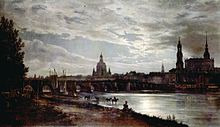
Blick auf Dresden bei Vollmondschein
3 notes
·
View notes
Text
Des concerts à Paris et alentour
Mai 13. Foals – Bataclan 14. Romain Berteau + Claus & Clausen + Borja Flames + Ambeyance (fest. Switch) – théâtre de Vanves 14. Erikm & Anthony Pateras + Dieb13 & Burkhard Stangl – Instants chavirés (Montreuil) 14. Ramona Cordova + Charlène Darling – Mains d'oeuvre (Saint-Ouen) 16. Saudaá Group + Orgue-Paysage – Fondation Cartier 16. Voiski + Myako & Basses Terres + Marylou (RA Paris) – Silencio 16. Franck Vigroux & Antoine Schmitt : "Chronostasis" + Quatuor Impact & Giani Caserotto + Open Women Orchestra (fest. Switch) – théâtre de Vanves 17. Crave + Zaltan & PAM + Full Circle + Low Jack + Oko dj + Clara3000 (RA Paris) – Dizonord (gratuit) 17. Ujjaya + Archétype – Salle Icare|Médiathèque (Vélizy-Villacoublay) (gratuit sur résa) 17. Philip Glass : Études pour piano – Salle Pierre-Boulez|Philharmonie 17. Jacco Gardner + Chris Cohen + Eerie Wanda + Tonn3rr3 + Discovery Zone (Le Beau fest.) – Trabendo 17. Hen Ogledd + Faune – Instants chavirés (Montreuil) 17. Inigo Kennedy + Möd4rn + Stephanie Sykes – Rex Club 17. Polar Inertia + Dement3d + Ninos Do Brasil + Lokier + A strange Wedding + Full Circle – La Machine 17. Surgeon + S.Y.R.O.B + DJ Jee + Cénile Technorama – NF-34 18. Bruce Brubaker & Max Cooper : Glasstronica – Cité de la musique|Philharmonie 18. Eliane Radigue : musique (diff.) pour "Continuum" de Félicie d'Estienne d'Orves – Centre Pompidou 18. Planningtorock – Gaîté lyrique 18. Thurston Moore + HAHA Sounds Collective + L'Éclair + Luis Ake + Domotic + Pantin Plage (dj) (Le Beau fest.) – Trabendo 18. Croatian Amor + Re:Ni + dj Sacom + Hanah (RA Paris) – Badaboum 18. Brandt Brauer Frick + Collectif sin ~ + Axel Rigaud (fest. Switch) – théâtre de Vanves 18. Orphx + Konkurs (Blush Response & Sarin) + Blush Response + O/H – tba 18. Function + dj Deep + Lewis Fautzi – Concrete 19. DJ Sundae + Crystallmess + Betty + Toma Kami (RA Paris) – Concrete (gratuit) 19. Julien Claus – Ancienne Brasserie Bouchoule (Montreuil) (gratuit) 19. Commando Koko + The Soft Rider + We Will Woo ! – L'International 22. Housewives – Supersonic (gratuit) 23. Lots in Kiev + Thot + Brusque – Petit Bain 23. 1919 + Guerre froide + Pest Modern + Warum Joe – Gibus 24. Beak> + TVAM – Gaîté lyrique 24. Shonen Knife – Petit Bain 24. Antichildleague + Corps + Geography of Hell – Les Voûtes 24. Othello Aubern + City Dragon + None + Graal – Espace B 24. Felix Kubin & Hubert Zemler + Phuong Dan + RVDS & Best Boy Electric + Ron Morelli – La Station 24. Codex Empire + Dimitri Rivière + Nari Fshr + Sina XX b2b Munsinger – Petit Bain 25. Sydney Valette + Blind Delon + Ruines – Supersonic (gratuit) 25. Xeno & Oaklander + Automelodi + Void Vision – Petit Bain 25. Rebekah + Schwefelgelb + JKS + Regal + Parfait – tba 26. Jérôme Poret – Ancienne Brasserie Bouchoule (Montreuil) (gratuit) 26. New Berlin + Euromilliard – Pointe Lafayette 27. Me Donner + Somaticae + Nani ∞ Guru – Espace B 27. USA Nails + Dead Arms + Cohaagen – ESS'Pace 28. Alice in Chains + Black Rebel Motorcycle Club – Olympia ||COMPLET|| 29. Flotation Toy Warning + Raoul Vignal – Petit Bain 29. Unit Moebius + Scorpion violente + Prettiest Eyes (fest. Ideal Trouble) – La Station 29. Pizza Noise Mafia + Laz (Air Lqd & Lost Sound Bytes) + Bear Bones, Lay Low + Summer Satana + Tav Exotic + La Souris & l'éléphant + DJ Athome (fest. Ideal Trouble) – Centre Wallonie-Bruxelles 29. Big Brave + My Disco + Tu brûles mon esprit – Instants chavirés (Montreuil) 30. Cuntre (Lionel Fernandez & Nicolas Mazet) + Couloir Gang (fest. Ideal Trouble) – Le Zorba 30. AnD (dj) + Dyen + Parfait [Blawan + ABSL : ANNULÉ] – NF-34 31. François Bonnet + Knud Viktor + Jim O'Rourke + Florian Hecker (fest. Akousma) – Studio 104|Maison de la Radio 31. De Ambassade + Beau Wanzer + Anna Funk Damage + Le Matin + Bernardino Feminielli + Unas + Fiesta en el vecchio (fest. Ideal Trouble) – La Station
Juin 01. Eryck Abecassis & Reinhold Friedl + Hilde Marie Holsen + Anthony Pateras + Lucy Railton (fest. Akousma) – Studio 104|Maison de la Radio 01. Millimetric + Phase fatale + Terence Fixmer + Dersee + Raffaele Attanasio + 14Anger + Arnaud Rebotini & David Caretta – Studio de Lendit (La Plaine-Saint-Denis) 01/02. Metronomy + Laurent Garnier + Ricardo Villalobos + Mr Oizo + Bonobo (dj) + Yves Tumor + Marie Davidson + Pond + Sleaford Mods... (fest. We Love Green) – Bois de Vincennes 02. Bernard Parmegiani + Jean Schwarz (fest. Akousma) – Studio 104|Maison de la Radio 02. Vanishing Twin + Eye (fest. Ideal Trouble) – Lafayette Anticipations 04. Kurt Liedwart + Billy Roisz + Julien Ottavi + Eryck Abecassis – Instants chavirés (Montreuil) 05. Shellac – La Maroquinerie 05. Institute + Last Night + The Cherry Bones – L'International 05. Otzeki – Safari Boat 06. Tim Hecker & Konoyo Ensemble + Mondkopf + Kelly Moran (Villette sonique fest.) – Cabaret sauvage 06. Umwelt + Falhaber + VII Circle – NF-34 07. Danny Brown (Villette sonique fest.) – Périphérique 07. Constant Mongrel + Computerstaat + Warm Swords – Espace B 07. Kuss + HDN – La Plage|Glazart 08. Julia Holter + Cate Le Bon (Villette sonique fest.) – Trabendo 08. Deena Abdelwahed + David August + Ross from Friends + Objekt (dj) + Apollo noir (dj) (Villette sonique fest.) – Grande Halle 08. Thurston Moore Group + Modern Men – La Maroquinerie 08. Nova Materia + Maria Violenza + Aïsha Devi + Belmont Witch + Black Midi + Coucou Chloé + Front de cadeaux + Juan Wauters + Krampf (dj) + Musique chienne + Nyoko Dokbaë + Novelist + Shanti Celeste + Szun Waves + Wiki (Villette sonique fest.) – parc de la Villette (gratuit) 09. Fontaines DC + Crack Cloud + Efrim Menuck + Bracco + Mdou Moctar + Corridor + The Messthetics + Warm Drag + Borja Flames + Myako + Zaltan & Oko + Tiger Tiger + Sinkane 09. Stereolab + Jonathan Bree + Anémone (Villette sonique fest.) – Grande Halle 12. The Soft Moon – Safari Boat 12. Rouge Gorge – L'International 12. Matmos + John Wiese – Instants chavirés (Montreuil) 13. Minuit Machine + Hørd + Marble Slave – Supersonic (gratuit) 13. Christian Death + Little Nemo – Gibus 13. Fat White Family – Élysée Montmartre 13. The Horrorist + Poison Point + Melania + Philipp Strobel – NF-34 14/15. Jessica 93 + Year of No Light + Hangman's Chair + JC Satan + Vox Low + White Heat (15 ans de New Noise) – Trabendo 15. Karen Gwyer + Gudrun Gut + Dorit Chrysler joue Laurie Spiegel – Gaîté lyrique 15. Ensemble Citrouille + Félicie Bazealire + Foxtrt + Delphine Dora + Manolito + Anna Serra + Sophie Agnet & Olivier Benoit + Trans Aéolian Transmission + Hippie Diktat (fest. Les Oreilles libres) – Théâtre Les Thénardiers (Montreuil) 16. Siglo XX + The Arch – La Maroquinerie 16. Plaid – Petit Bain 16. Vomir + Straub Mocky + Achille + Strie + LV2 + Trans Kabar + Club Sieste (fest. Les Oreilles libres) – Théâtre Les Thénardiers (Montreuil) 18. Simon Whetham + Estelle Schorpp – Instants chavirés (Montreuil) 19. Stephen Malkmus & The Jicks – La Gaîté lyrique 21. Anne Clark : perf. pour "Ocean 21" de Maggie Boggaart – Auditorium Saint-Germain 22. The Intelligence + Flatworms – La Maroquinerie 22. LA Witch – Black Star 23. La Pince + Leon + Howdoyoudance + Polar Polar Polar Polar – Cirque électrique 26. Magma – Salle Pierre-Boulez|Philharmonie 26. Cannibale – Safari Boat 26. Caterina Barbieri + SKY H1 – La Gaîté lyrique 26. Pigalle – La Maroquinerie 26. Daniel Menche + Point invisible + Tzii – Instants chavirés (Montreuil) 27. Plomb + Perm36 + Pour X raisons – Cirque électrique 28. To Live & Shave in LA + Carrageenan + TTTT – Instants chavirés (Montreuil) 28/29. Rammstein – La Défense Arena (Nanterre) ||COMPLET||
Juillet 02. Interpol – Olympia 04. Cat Power + H-Burns (fest. Days off) – Salle Pierre Boulez|Philharmonie 05. Klimperei, Sacha Czerwone, David Fenech, Denis Frajerman & Christophe Micusnule – Chair de poule (gratuit) 05. Pantha du Prince + Scratch Massive (fest. Days off) – Cité de la musique|Philharmonie 05. I Hate Models + Jardin + Mount Kimbie + Oktober Lieber + Rodhad + Mor Elian + Olivia... (The Peacock Society fest.) – Parc floral 05. The B-52's – Olympia 05/06. The Psychotics Monks + La Jungle + Yachtclub + Zombie Zombie + Frustration + Fleuves noirs + Bruit noir + Le Singe blanc + Le Sacre du tympan + Enablers + Os Noctambulos + The Scanners... (fest. La Ferme électrique) 06. Jonsi & Alex Somers jouent "Riceboy Sleeps" (fest. Days off) – Salle Pierre Boulez|Philharmonie 06. Helena Hauff b2b DJ Stingray + Jon Hopkins + Motor City Drum Ensemble + Len Faki + Robert Hood + Octavian + The Black Madonna + Clara! + Nicola Cruz... (The Peacock Society fest.) – Parc floral 07. Jonsi, Alex Somers & Paul Corley : "Liminal Soundbath" (fest. Days off) – Cité de la musique|Philharmonie 07. Ministry – La Machine 07/08. Thom Yorke (fest. Days off) – Salle Pierre Boulez|Philharmonie 08. Gossip – Salle Pleyel 08. Melvins – La Plage|Glazart 11. Full of Hell + The Body + Pilori – Gibus 11. Masada + Sylvie Courvoisier & Mark Feldman + Mary Halvorson quartet + Craig Taborn + Trigger + Erik Friedlander & Mike Nicolas + John Medeski trio + Nova quartet + Gyan Riley & Julian Lage + Brian Marsella trio + Ikue Mori + Kris Davis + Peter Evans + Asmodeus : John Zorn's Marathon Bagatelles – Salle Pleyel 11. Flamingods + Warmduscher + Triptides (Garage MU fest.) – La Station 12. Tomaga + Утро + Tôle froide + Society of Silence + Sharif Lafrey + Elzo (dj) (Garage MU fest.) – La Station 11>13. Kraftwerk (fest. Days off) – Philharmonie 13. The Will Gregory Moog Ensemble (fest. Days off) – Le Studio|Philharmonie 13. Chloé & Vassilena Serafimova : "Sequenza" + Apparat (fest. Days off) – Cité de la musique|Philharmonie 13. La Récré (Garage MU fest.) – canal de l'Ourcq 13. Metz + Bo Ningen + Ashinoa + Die Ufer + Panstarrs (Garage MU fest.) – La Station 17. Grand Blanc – Safari Boat 18. Neurosis + Yob – Bataclan
Août 18. The Driver – But Mortemart|Bois de Boulogne 23>25. The Cure + Aphex Twin... (fest. Rock en scène) – parc de Saint-Cloud 26/27. Patti Smith – Olympia ||COMPLET|| 28. Arnaud Rebotini – Safari Boat
Septembre 05. Oh Sees – Bataclan 12. Blawan – NF-34 14. Clan of Xymox + Plomb – Gibus 14. Danny Elfman & le Grand Orchestre d'Ile-de-France : cinéconcert sur "Alice au Pays des merveilles" de Tim Burton – Salle Pierre Boulez|Philharmonie 20. Spiral Stairs + Canshaker Pi – Olympic café 23>25. John Cale – Cité de la musique|Philharmonie
Octobre 05. Nuit de l'orgue avec des œuvres d'Éliane Radigue, Arvo Pärt, Olivier Messiaen, Phillip Glass, Nico Muhly, Jonathan Fitoussi... (Nuit blanche) – Salle Pierre Boulez|Philharmonie (gratuit) 06. Daughters – La Maroquinerie 08. Sleep – Bataclan 09/10. Ty Segall & Freedom Band – La Cigale 11. New Order – Grand Rex 14. King Gizzard & Tle Lizard Wizard – Olympia 17. Puppetmastaz – Trabendo 18. Dream Syndicate – Petit Bain 19. Sisters of Mercy – Bataclan 19. Pixies – Olympia
Novembre 08. Bedroom Community – Cité de la musique|Philharmonie 08. Boy Harscher – Trabendo 10. Amiina : cinéconcert sur "Fantomas" de Louis Feuillade – Le Studio|Philharmonie 10. Ôlafur Atnald + Hugar – Salle Pierre Boulez|Philharmonie 17. Nitzer Ebb – La Machine 24. The Young Gods + Les Tétines noires – La Machine 26. Wardruna – Olympia
Décembre 06. Phillip Glass Ensemble : cinéconcert sur "Koyaanisqatsi" de Godfrey Reggio – Salle Pierre Boulez|Philharmonie 07. Phillip Glass Ensemble : cinéconcert sur "Powaqqatsi" de Godfrey Reggio – Salle Pierre Boulez|Philharmonie 08. Phillip Glass Ensemble : cinéconcert sur "Naqoyqatsi" de Godfrey Reggio – Salle Pierre Boulez|Philharmonie
2020
Janvier 04. Rokia Traoré + Ballaké Cissoko & Vincent Segal – Salle Pierre Boulez|Philharmonie
Février 16. Orchestral Manoeuvre in the Dark – La Cigale
Mars 07. Ensemble intercontemporain joue Steve Reich : cinéconcert sur un film de Gerhard Richter – Salle Pierre Boulez|Philharmonie 20. Ensemble Dedalus joue "Occam Ocean" d'Éliane Radigue – Le Studio|Philharmonie 21/22. Laurie Anderson : "The Art of Falling" – Cité de la musique|Philharmonie
Mai 08. Max Richter : "Infra" + Jlin + Ian William Craig – Cité de la musique|Philharmonie 09. Max Richter : "Voices" – Salle Pierre Boulez|Philharmonie 10. Max Richter : "Recomposed" & "Three Worlds" – Salle Pierre Boulez|Philharmonie 24. Damon Albarn – Salle Pierre Boulez|Philharmonie
en gras : les derniers ajouts / in bold: the last news
7 notes
·
View notes
Photo

Casper Clausen
Crossing the bridge from time to time.
Dutch translation.
Date of interview: November 15, 2017 in Lisbon, November 28 in Antwerp
Estimated reading time: 17 minutes
After picking Casper Clausen (°1982, Sonderborg) up at his guesthouse, we install ourselves on the terrace of Antwerpian institution Café Zeezicht, where he has already become a familiar face. Both the name of the bar and the outdoor heaters keeping us warm, are poor substitutes for the scenery in which we met before. Together with photographer Astrid, I ran into the Danish musician and singer along the cliffs of Almada basking in the late autumn sunlight a few weeks earlier. In this part of Lisbon - a short ferry ride away from the city centre – him and his companion Mads Brauer had been creating new material in the studio: the former Portuguese fisher society turned into a rather unique art residency space. While Casper gives us a little tour in the ateliers, chatting with other residents, showing us Ernesto the house cat’s drinking fountain, Mads starts working. Later, when Casper joins him, we stick around and feel like two children witnessing a fairy tale, mesmerized by sound and sight intertwining. Behind the two musicians, the sun is setting over central Lisbon and we feel privileged, eavesdropping on the beginnings of Altid Sammen, which they later premiered in January with B.O.X, a contemporary baroque ensemble.
But even in the pre-Christmas setting of Antwerp, the titillating lightness of Lisbon is still lingering around Captain Casablanca. That is the moniker he uses for his solo project, next to his bands Efterklang, Liima and various other musical collaborations and explorations. It might be the change of scenery – having spent the afternoon rehearsing in a baroque church- or the nearing end of the year, but Casper shows a remarkable affinity for nostalgic reflections. After noticing the old paper I scribbled my preparation for the interview upon, our conversation spirals around the topic of time and how to capture it as an artist: whether it be on an album, by relocating to the Portuguese capital or through autobiographical writing.
How did you end up in Lisbon? Was it a conscious move to the south?
The short answer would be: I lived in Berlin before for six years and I was very tempted to go to the south of Europe. Flama, our promoter and friend in Lisbon, kept asking me to come over. Then I spent a month there three years ago, just to see how it went. In that same period of time, I also recorded an album with the French cellist Gaspar Claus, called Claus and Clausen. I really liked the change, the southern mentality. People are a bit more loose and welcoming. So when I finally decided to move, I didn’t exactly know what the mission was. I was attracted to this more bodily way of approaching music. Coming from Berlin and Copenhagen, it’s quite heavy sometimes. People tend to think a lot in terms of concepts in the north; Lisbon is more about rhythm, culture and dance.
It was the exotic touch I needed. I was attracted to the light, to the poetry of the place, the music, the sounds. I felt there was a calling in that. In the end it turned into some sort of mission for myself to make solo music, although it wasn’t that conscious from the beginning. I was so far away from the others from Liima and Efterklang that I had to start something on my own.
I was attracted to this more bodily way of approaching music.
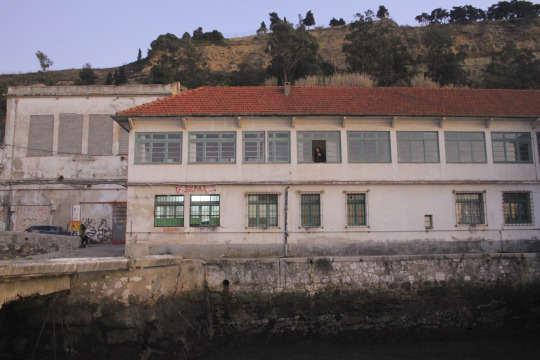
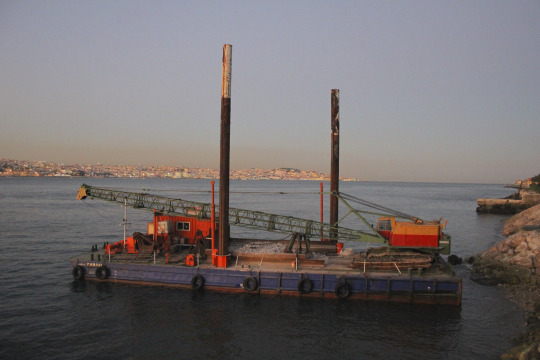
How would you describe the influence of the city on your work?
I try not to think so much about it, but I see it slips in in some sort of way. I’m definitely attracted to a freer form of music. It started already a little bit in Berlin, but Efterklang’s music is more structured. I like the idea of making things quite fast and just playing some shows, making casual appearances. I met a lot of people and I got a lot of open doors in Lisbon, so I could play these small shows in clubs whilst building my solo repertoire. Every time I tried to perform something new.
There are tons of ideas that I got from being in the area that I’d like to explore. There are all these different musicians around and Portugal has a very rich music culture. It has been a great opportunity to be an outsider again. There’s for example Cabo Verde music, or traditional Rancho from the North, which has a very interesting set-up. I get a lot of input and I’d love to get a little closer to it. People who have been living there for a long time, take things for granted that I find fresh and inspiring.
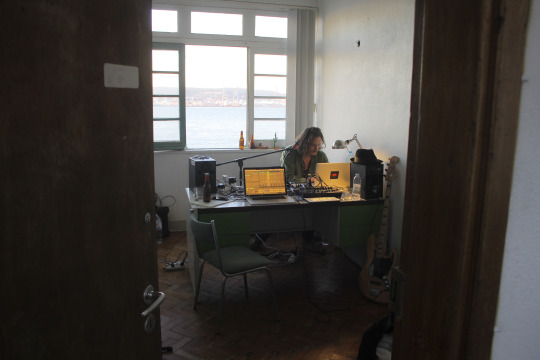
It has been a great opportunity to be an outsider again.
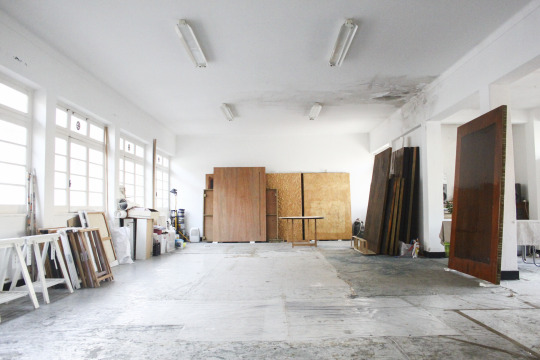
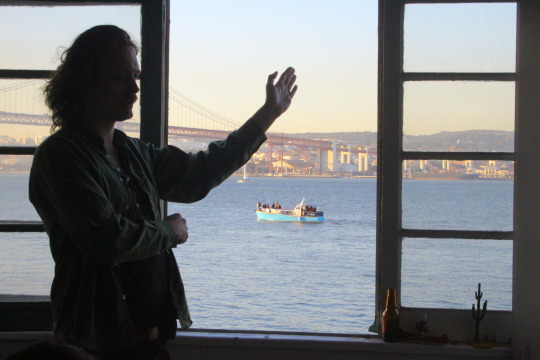
How is Lisbon’s arts scene different from Berlin’s?
I’m curating an evening soon, called Casper Clausen e amigos (laughs). I like the playfulness, keeping things light and inviting friends. There’s still this ritual of playing music. People are really up for playing here, not just in terms of playing music, but playing around. It doesn’t have to be this ‘epic’ thing. There are not as much institutions. Everything is more DIY, in a sense that they need to make things happen uncompromised to their idea. It fits me quite well at the moment that approach. Another difference with Berlin is that there are more people who’re originally from Lisbon, whereas Berlin is more of a mix from people from all over the world.
People are really up for playing in Lisbon, for playing around. It doesn’t always have to be this ‘epic’ thing.
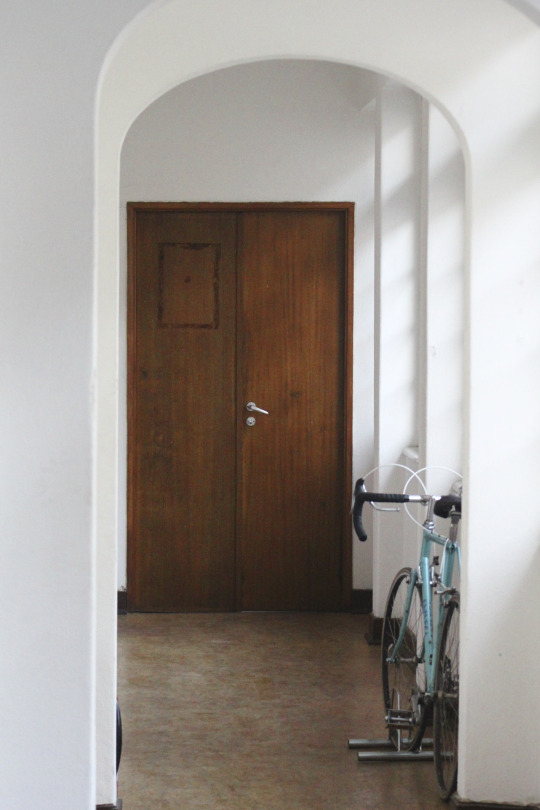
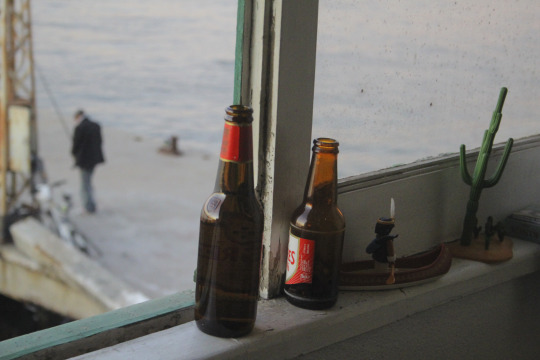
Your studio also seems a ritualized space for creation: this view, the calmness of the area, the water surrounding you… How did you find it?
I found it through my friend André Gonçalves. He was one of the first people I met here, he’s also a musician and builds modular synthesizers (ADDAC). He was my introduction to the city, together with my other friend Flama. They are two extremely different people. Those two men have been the guides into the city for me. André is more of a cave man, a sound wizard, while Flama introduced me to the social life of Lisbon. André spends most of his time in his factory of modular synthesizers in another part of town. Through him, I met Rui (Suares Costa, visual artist), because they used to share another studio together.
Those two extremely different men have been the guides into the city for me.
Rui had just started off this place when we met. He was kind of tired of painting and creating all alone. He once told me that it feels natural to be alone, but he made this promise to himself that he wants this art residency, so he has people around him that can disturb him. His paintings are intense, repetitive work. He created this place as a residency where artists from all over the world could stay for a while. My residency just seems to have turned into a very long one, 8 months by now (laughs).
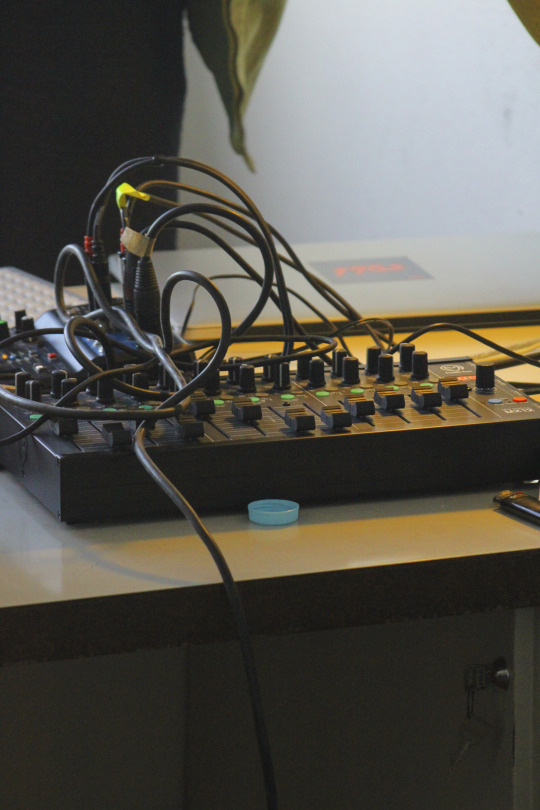
Do you become sort of a cave man as well when you’re creating?
I definitely have both sides in me. I like to completely unsubscribe from society from time to time and just hang out with myself. Very few people would say I have those both sides probably. Others would probably laugh at me and say “Oh Casper, you’re such a social man.” I am, but it’s not the only facet of myself. I do enjoy that a lot, but I always come back to that little space that I need. Lisbon leaves space for both these sides in me.
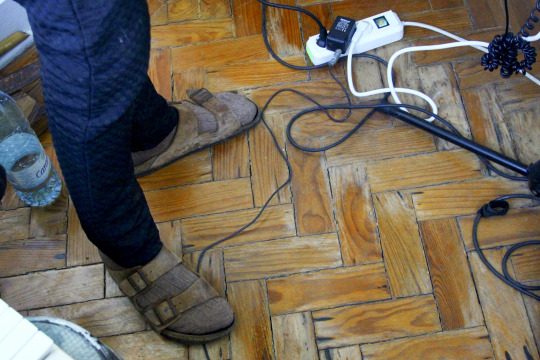
You have to cross the water from time to time, take the ferry?
Exactly. That’s a good way of putting it. Also these two people, Flama and André, two extremes, symbolize something important for me.
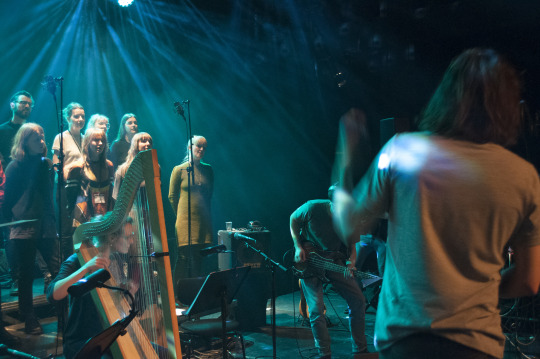
The last album you made with Liima got described in a review as “nostalgic and looking towards the future at the same time”, again dealing with a certain duality. Are you a nostalgic soul or more grounded in the present?
I’m definitely a nostalgic soul. I like the romantic way of looking at life, at things that have been in the past: things you have been going through yourself, historical moments, or great stories that make you feel very small. Such knowledge of the past can be very moving. When I was rehearsing in that baroque church earlier, I realized it can be very heavy. If I devote all my time to it and become very humble to the past, I feel a sort of heaviness I’m not sure I really like. I want to be shaken up once in a while. Someone going like “Hey, you’re living in 2017”. Instead of being afraid of the future, I try to be excited about it.
What I like at the moment, at least regarding to music, is the different genres of the past, different ways of recording. Amazing things have been happening over the past eighty years. All of those era’s carry something. Now we can just take something from everywhere and mix it up. This really excites me, to use the knowledge that it becomes something new, instead of constantly trying to do something new. I am aware that someone has already been harvesting this, but I can use it in the present time. You can cook something up, you know.
I am definitely leaning towards the nostalgic end of the spectrum. You come across a weird duality sometimes, which can be frustrating, because you cannot always morph things.
I am aware that someone has already been harvesting this, but I can use it in the present time. You can cook something up, you know.
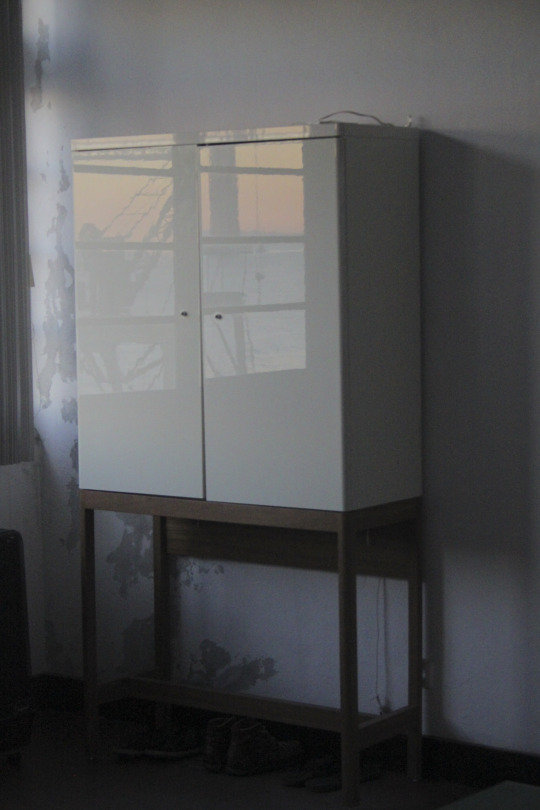
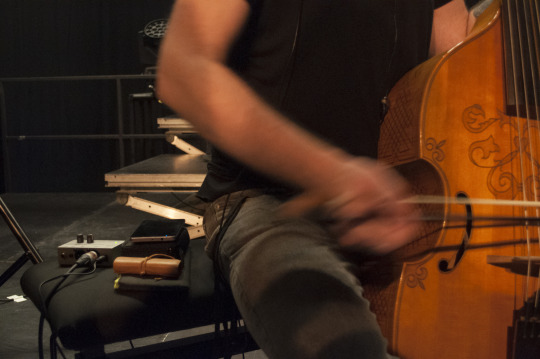
Even in your own story, you highlight certain things.
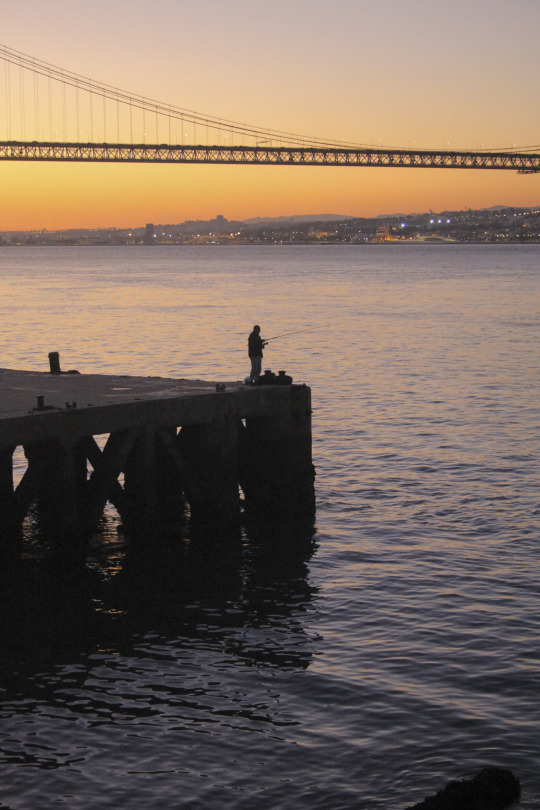
What’s the story behind your album with the French cellist Gaspar Claus?
Our grandfathers crossed each other in the same spot of Lisbon.
For real?
(smiles) It’s a little bit of a romantic story. He’s my brother in a way, even our names resemble each other. We are very much like night and day, extremely different. He likes working during the day, I like to work during the night. He’s quite strict, I’m more floaty. But we felt that there was a sort of story that we could tell. We met through the French filmmaker Vincent Moon. That album is us playing together for the first time, literally. We were sitting in a room, pushing “record” and playing. This kind of meeting was a bit like creating a story based on that. At the time, I was quite into the idea of changing the past. If you create a story, you invent something. We’re playing with reality and fiction and try to find a space there. It’s based on facts, but re-written. We highlight certain things when we tell a story, even for‘real’ events. It doesn’t matter if it was yesterday or a hundred years ago. Even in your own story, you highlight certain things.
Mads joins us for a while. They talk about the rehearsal, about working with a baroque orchestra, how working in those big institutions is different from their own floaty practice. “It’s the closest we have ever gotten to ‘real’ work,” they laugh “being in this room, having a schedule for creating.” But the orchestra has been very giving in the way they think and create together with them.

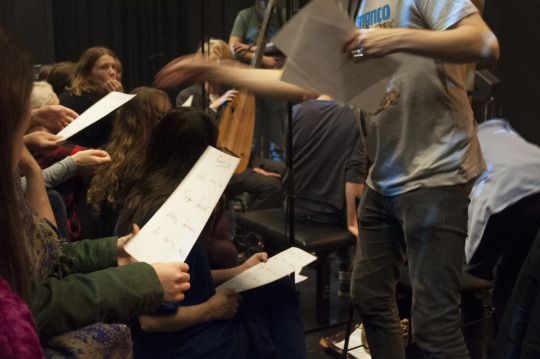
Did you do research for this baroque project?
Just googling (laughs). The ensemble is not really interested in playing strictly baroque music. I think we’re more intrigued by baroque music than they are, in a way. It’s funny, they’re trying to escape it with their instruments while we’re enthusiastic about it.
Coming back to this notion of nostalgia: do you keep a journal yourself? And is it linked to your songwriting?
Lately I moved all my stuff from Berlin to Lisbon, so I came across some notebooks. I’m definitely not a diary guy, I don’t sit down every day to write, but I still scribble down a lot. I just don’t have an organized system. Many times it mixes up with lyrics or songs. My best diaries are my songs. I think I have this distinction between writing down what is happening and then more of an opinionated look on it all. The latter is mainly what turns into lyrics.
My best diaries are my songs.
The other side is more therapy-like. “What did you have for breakfast today, Casper? Where were you?” It’s writing things down in a strict way for myself. I’m hoping to morph those two at some point. Sometimes when I make music from these kind of observations, it doesn’t stick so well. Lyrics come more from singing for me now, rather then they come from writing. I’d love to come to a point where I could write something down and make some music for it. I think it’s a very different way of making music. A friend of mine, Karl Hyde from Underworld, is a mentor in that sense. He likes this methodic writing. Everyday he takes an hour out of his schedule to go to a café and write. He has notebooks for years. So when he needs lyrics, he figures out if something makes sense. I’m naturally always looking for a moment in the moment of the music being created. Which I think is a beautiful way of working, but I would kind of love to find that other way of making music and writing lyrics.
I have a fascination for autobiography, authors explaining their methods, the kind of romantic relationship they have with that. But that’s definitely not me at the moment.
I’m naturally always looking for a moment in the moment of the music being created.
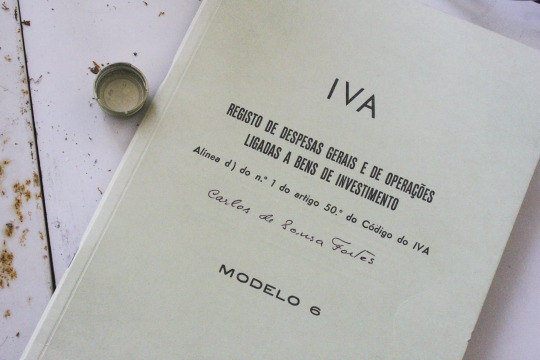
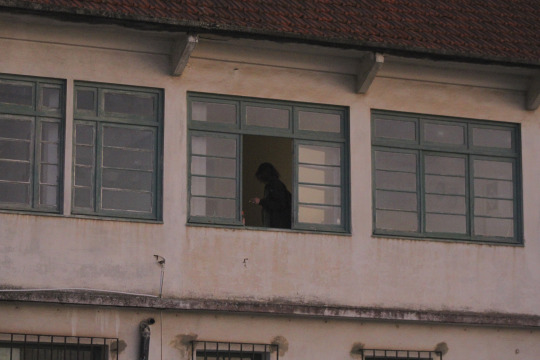
What is your fascination with autobiography about?
Awareness of a certain working method fascinates me, when someone explains a working structure for example. I’m not there yet to nail myself down to that, I feel like I still escape whenever I’m approaching it. It’s like I need to demolish the ship and go do something else. Somehow I’m resistant, but I’d love to get better at it .I love seeing opportunities, but also taking them. Staying with one thing for a longer time, is for some reason, not easy for me. It’s a strange learning process. You get attracted by different things. The last three years have been a lot like that. Before it was ten years of Efterklang and nothing else.
A lot of the lyrics on 1982, our second album with Liima, are about eternal opportunities versus sticking to what you are. Of course it’s related to things around me, but I had the suspicion it had much more to do with me, being where I am right now, in the middle of a life, looking in different directions.
(I get ourselves some more drinks inside. I realize too late I got a white wine instead of a red wine. “Apparently it’s very hard to taste the difference between red and white in the dark.”, Casper remarks. “We’re very conditioned by sight to taste the difference.”)
You also work very consciously with visual material right now in your performances.
True, they are making a movie about me - which sounds like a very weird thing to say.(laughs) A friend of mine, Sebastiao Braga, has a film collective and got intrigued by me as a figure in the city. I am constantly dis- and reappearing: a sort of present absence. There have been made some beautiful movies about Lisbon in different era’s, capturing the Zeitgeist. He now wants to portray me as a character in this specific scenery of Lisbon, create a fictive story based on reality. I invited him to come along to my solo shows, to explore what happens if I incorporate video in my performances. We developed the idea to follow me the day of the show, up until the point where I get on stage. We experiment a lot with abstract levels of images, extreme zooms, or just light and projections.
It’s something that came up after playing so many shows. It feels like you’re copying the same thing. I want to explore how to make everything a unique space, dress it entirely: play with the ephemeral. At the same time, I have been a little destructive with this idea: it started to make sense to also use these visuals for the movie.
It’s very important for him to be in the moment. Whatever goes wrong, is part of the show. He has the ability to become like an extra musician with his camera. It’s not about the right way to capture it. That which he frames, is the narrative he wants to create. The movie is exactly all those things that we don’t film. Realizing that, as a musician, is inspiring. It’s just as important to frame your work. You want everything inside, embrace all of it. I’m coming from that background, being a maximalist. I have all these tiny melodies in my mind while making songs and they need to find their place. That’s something I enjoy in my solo work now: doing very little, but zooming in, focusing on something for a longer time after all.
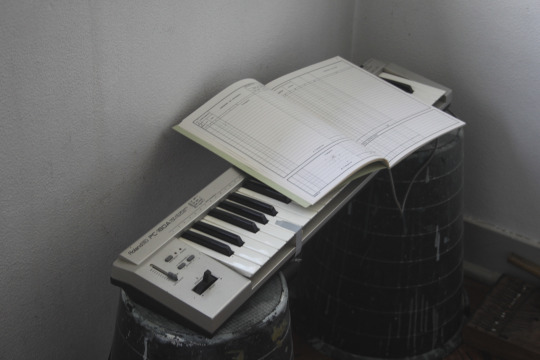
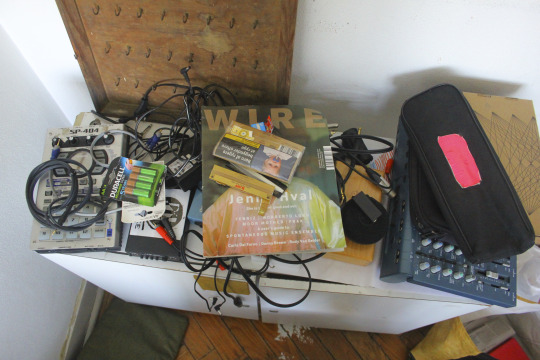
One thing you can at least hang your head on, is that you capture a certain time, a certain energy. That idea is comforting, it’s like a gift. It’s a celebration of a certain moment. To capture something is also to make a comfortable space out of it, so you can look back to it and you can think about yourself in that place. It gives you some kind of personality. But besides yourself and your ego, it says something about that place too, the people that were there, the vibe of the place. We do this with Liima too, during residencies. Certain songs are reflections of the time spent in that exact spot.
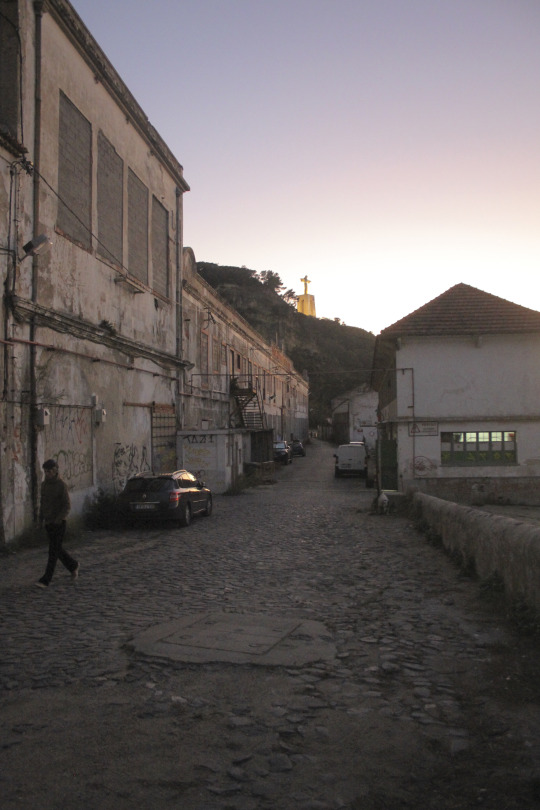
You share quite a lot on Instagram. What’s your relation with social media as an artist?
I do. I’m having a bit of bad conscious about it at the same time. I use Instagram stories quite a lot, but I didn’t think so much about the concept of stories before. The fact that it disappears again… It connects with the mindset I spoke about before, about being on stage with visuals, or being a musician. “Now I’m here, let’s make something out of that.” Of course I have my doubts about it: what do I want to share? Persona-wise: how do you look at yourself, how do you feel about yourself? You’re developing a character. The question is again about how much you’re giving away to that character. It’s the creation of a narrative: what do I highlight? Because if you just base it just on fictional elements, it doesn’t become authentic. It needs some roots in something that is unmistakably authentic. You’re creating a space for yourself, but it’s also the fundament where you’re picking up your ideas from. So what do you bring into music, or into that public space, from that space fundamentally for yourself? It’s important to create a safe ground, not to get lost in that vast ocean. Public space is an interesting given, because there’s a constant eagerness to it. You raise expectation to repeat whenever you did something great.
I don’t think I’ve found something else besides authenticity as the most real way to get things done. It’s exactly like that for singing. The very best part is when I don’t reflect about singing, when I just sing. And it carries onto other things as well.
B.O.X, Efterklang and Korus, june 2018 https://www.visitantwerpen.be/nl/barok/b-o-x
Claus & Clausen https://lesdisquesdufestivalpermanent.bandcamp.com/album/claus-clausen
Bull’s Eye Residency http://www.ruisoarescosta.com/bull-s-eye---artist-in-residence-program.html
Interview + translation: Tessa Vannieuwenhuyze Photography: Astrid Theunynck & Tom Peeters English editor: Maxim Ryckaerts Dutch editor: Britt Sterkens
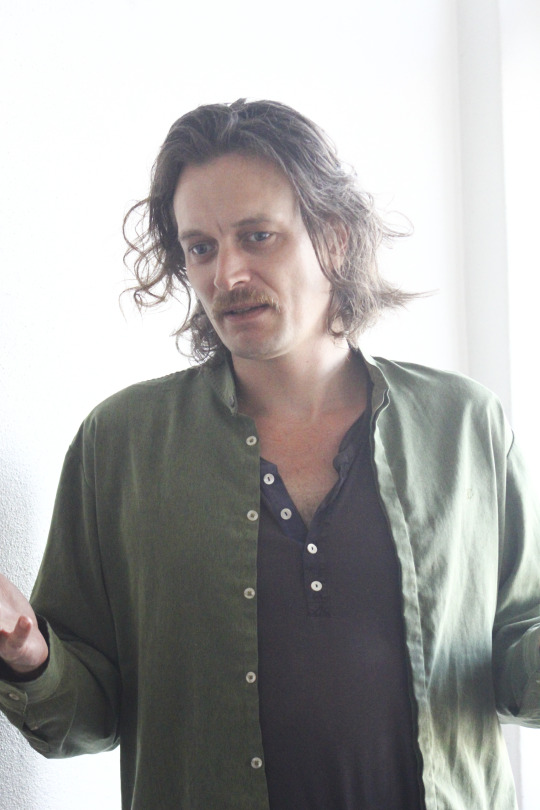
-
2 notes
·
View notes
Text
Berlin, I Love You
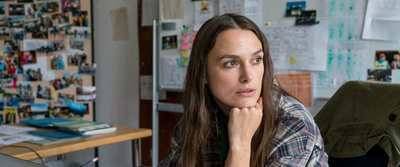
“Berlin, I Love You” is the latest edition in the “Cities of Love” franchise, a series of films created by producer Emmanuel Benbihy that consist of a series of short films, oftentimes featuring top names on both sides of the camera, that all take place in one specific city—previous installments have been centered around Paris, New Yor and Rio—and which all focus on the various possibilities of love that can be found there in a sort of intercontinental riff on “Love American Style.” For some viewers, this particular edition might seem like a bit of a hard sell because when one tries to imagine a city known for its overwhelmingly romantic properties, Berlin does not exactly leap to the mind in the way that Paris obviously does. To be honest, the film does not exactly make a convincing case for the idea of Berlin as a hub of passion, or really for its existence as a movie.
This time around, there are ten stories, one of which, Josef Rusnak’s “Transitions,” serves as a wraparound that eventually and tenuously connects the other segments. In that one, two street performers—an Israeli singer (Rafaelle Cohen) and a German (Robert Stradlober), who stands around dressed like one of the hovering angels from “Wings of Desire”—meet cute and find themselves gradually drawn to each other. Peter Chelsom’s “Berlin Ride” stars Jim Sturgess as a man who has come to Berlin to drink himself to death following a bad romance and who learns to live and love again. Massy Tadjedin’s “Under Your Feet” is about a refugee worker (Keira Knightley) who finds herself taking a young Arab child home with her while his mother is away, much to the consternation of her own mother (Helen Mirren), who wishes that she wouldn’t try to take on all the problems of the world herself. Til Schweiger’s “Love is in the Air” finds an aging American (Mickey Rourke) trying to pick up a much younger fellow American (Toni Garrn) in a bar and while I won’t reveal what happens from that point, the fact that the screenplay for this segment was penned by none other than Neil LaBute should alert you that happiness and good cheer are probably not just around the corner. On a much lighter note, “Berlin Dance” finds lost tourist Jenna Dewan stumbling into an elaborate ballroom dancing fantasia complete with an appearance by the famed Palast Orchester.
As can probably be determined by its title, Stephanie Martin and Claus Clausen’s “Me Three” tackles sexual harassment as a group of women (Emily Beecham, Veronica Ferres, Lili Gattyan and Phoebe Nichols) come together in a laundromat to discuss the various forms of abuse they have recently suffered at the hands of men and are then visited by the perfect embodiment of their rage, Dani Levi’s “Hidden” follows a refugee (Alexander Black) who is on the run from the police after being attacked by a group of punks and who takes refuge with a friendly prostitute (Carol Schuler). Diego Luna plays the title role in “Drag Queen,” in which his character has a riverside meeting of the minds with a teenaged boy (Michelangelo Fortuzzi) who is questioning his own sexuality. “Lucinda in Berlin” finds Dianna Agron pulling double duty as both the director and co-star, playing a winsome puppeteer who helps to rejuvenate a burned-out Hollywood producer (Luke Wilson). In the concluding tale, Justin Franklin’s “Embassy,” Sibel Kekilli plays a would-be journalist who is reduced to driving a cab to make a living when a potentially big story literally lands in the back seat of her car.
The trouble with movies of this sort is that even when the stories are good on an individual level, the need to shift from one narrative to the next every 10-15 minutes can lead to a certain amount of frustration after a while. With “Berlin, I Love You,” the problem is compounded by the fact that most of the stories are not particularly interesting, either on their own or as part of a whole, and don’t really make much of an argument for the romantic aspects of Berlin. In fact, while most of the stories in the Paris and New York iterations were undeniably connected to their settings, the connection here is far more abstract—a number of the stories here could be taken out and reset in practically any other city in the world with only minimal changes to the material. The tone is also all over the place, as whimsical stories like “Berlin Ride” and “Berlin Dance” rest uneasily amidst the ones involving the plights of refugees and the Times Up movement. The latter is especially awkward as it lurches between honest truth-telling in its early moments to something broader and sillier that concludes, I kid you not, with a wacky dance party.
Of the stories, my favorite is probably “Berlin Dance,” which may be the slightest of the bunch but which is undeniably charming nevertheless. I also liked “Embassy,” which may not be especially romantic in nature but which does a good job of packing an action-packed espionage saga into only a few minutes. “Love is in the Air” is not especially good—the twist can be seen a million miles away—but Rourke’s performance is strong and sure. “Hidden” has an intriguing premise but is over too quickly to make much of it, a problem which also befalls “Drag Queen” (the latter also dogged by the perhaps dubious casting of Diego Luna in the title role). “Berlin Ride” is just kind of silly. “Under Your Feet” is well-meaning but oddly shifts its focus from the refugee problem to the comparatively uninteresting mother-daughter dynamic. “Transitions” is cute and that is about it. “Me Three” starts well but ends badly. The biggest flop, however, is “Lucinda in Berlin,” which is such a wan little embarrassment that its presence can only be explained by the fact that the presence of Wilson and Agron might attract a few more viewers.
Of course, making a multi-story film of this type in which all the tales are bonafide hits is practically impossible. In the case of “Berlin, I Love You,” only a couple of them really work and even those are not quite good enough to encourage viewers to slog through the rest in order to see them. At first glance, this may look like a moviegoing feast, but those who do make it through will find themselves feeling overstuffed and yet still somehow unsatisfied and hungering for a real movie. For those, may I recommend “Wings of Desire,” a film which is both a vastly superior work and which offers a more satisfying look at the idea of love in Berlin than this one can even begin to muster.
from All Content http://bit.ly/2GhLIIM
0 notes
Text
Anmeldelse af Fredericias Elite hold i 3-bande carambole kamp
Anmeldelse af Fredericias Elite hold i 3-bande carambole kamp
I weekenden den 15-16. oktober var Fredericias elitehold i 3-Bande Carambole i kamp igen. De gæve gutter gjorde en flot indsats. Lørdag spillede de mod BK Amagerbro og det blev uafgjort 4-4. Kim Nielsen og Per Hermansen vandt deres kampe og fremhæves skal Kim Nielsen med et flot snit på 1,235, hvilket er over hans normale gennemsnit. I toppen af ligaen ligger BK Grøndal og søndag blev til et…
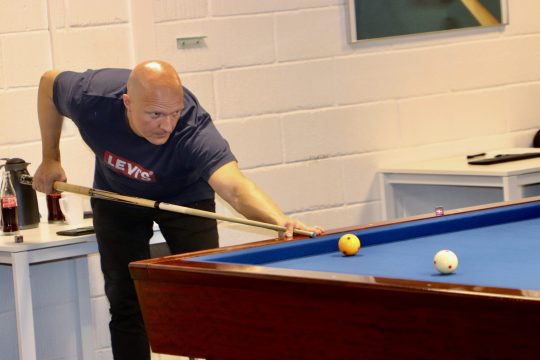
View On WordPress
#Claus Mosskov#Danmark#Fredericia#Fredericia Elite#Fredericias elite hold består af: Søren Andersson#Jan Clausen#Kim Nielsen#Per Hermansen#Sport: anmeldelse Fredericias Elite hold i 3-bande carambole kamp
0 notes
Text
Gaspar Claus et Casper Clausen
Gaspar Claus et Casper Clausen
Pour son premier concert officiel, l’inattendu duo homophone franco-danois Gaspar Claus et Casper Clausen a conçu une soirée intimiste et réservée, errant entre élégance et cauchemar dans un univers vaporeux et ineffable (more…)
View On WordPress
0 notes